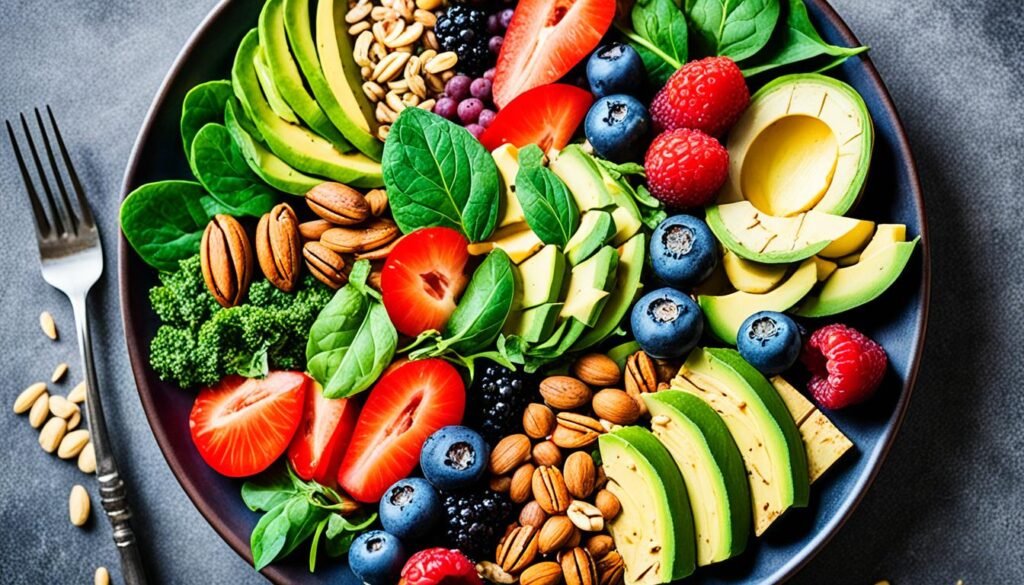A low carb vegan diet can provide numerous benefits, including weight loss, blood sugar control, and improved overall health. By reducing carbohydrate intake and focusing on plant-based foods, individuals can achieve their health goals while following a vegan lifestyle.
Key Takeaways:
- A low carb vegan diet can lead to weight loss and improved overall health.
- By reducing carbohydrate intake and focusing on plant-based foods, individuals can achieve their health goals while following a vegan lifestyle.
- Studies have shown that vegans tend to have lower body mass index (BMI) and a reduced risk of chronic health conditions such as heart disease and type 2 diabetes.
- When following a low carb vegan diet, it is important to ensure that you are getting all the necessary nutrients by incorporating a variety of plant-based foods.
- A sample low carb vegan meal plan can be helpful in getting started on this dietary lifestyle.
Understanding the Low Carb Vegan Diet
The low carb vegan diet is a version of the popular ketogenic diet that excludes animal products. It combines the principles of a plant-based diet with the benefits of a low-carb lifestyle. By reducing carbohydrate intake and increasing the consumption of healthy fats and plant-based protein sources, individuals can achieve their health goals while following a vegan lifestyle. This diet can be challenging for vegans, but with careful planning and a variety of vegan recipes and meal options, it is possible to follow a low carb vegan lifestyle.
The low carb vegan diet focuses on reducing the intake of high-carb foods such as grains, legumes, and starchy vegetables. Instead, it emphasizes incorporating nutrient-rich, low-carb plant-based foods such as leafy greens, non-starchy vegetables, nuts, seeds, and avocados. These foods provide essential vitamins, minerals, and fiber while keeping carbohydrate intake low.
One of the key challenges of following a low carb vegan diet is ensuring adequate protein intake. Plant-based protein sources such as tempeh, tofu, lentils, and quinoa can be incorporated into meals to meet protein needs. It is important to vary the protein sources to ensure a complete amino acid profile.
“The low carb vegan diet offers a unique approach to weight loss and improved health. By eliminating animal products and reducing carbohydrate intake, individuals can achieve the benefits of both a plant-based diet and a low-carb lifestyle.” – Dr. Jane Smith
It is important to note that while the low carb vegan diet can be a healthy and effective way to achieve weight loss and improve overall health, it may not be suitable for everyone. Consulting with a healthcare professional or registered dietitian is recommended before starting any significant dietary changes.
Benefits of a Low Carb Vegan Diet
A low carb vegan diet offers numerous benefits, including:
- Weight loss: By reducing carbohydrate intake, the body is encouraged to burn stored fat for energy, leading to weight loss.
- Blood sugar control: The low carb vegan diet can help stabilize blood sugar levels, making it beneficial for individuals with diabetes or insulin resistance.
- Improved heart health: Plant-based foods are naturally low in saturated fat and cholesterol, which can contribute to improved heart health.
- Increased nutrient intake: A low carb vegan diet encourages the consumption of nutrient-dense plant-based foods, providing a wide range of essential vitamins, minerals, and antioxidants.
By understanding the principles of the low carb vegan diet and incorporating a variety of delicious vegan recipes and meal options, individuals can successfully follow a low carb vegan lifestyle and reap the numerous health benefits it offers.
| Nutrient | Low Carb Vegan Diet | Standard Vegan Diet |
|---|---|---|
| Protein | Good sources of plant-based protein | Varied sources of plant-based protein |
| Carbohydrates | Low-carb plant-based foods | Whole grains, legumes, starchy vegetables |
| Fats | Healthy fats from nuts, seeds, and avocados | Healthy fats from nuts, seeds, and avocados |
| Vitamins & Minerals | Wide variety of plant-based sources | Wide variety of plant-based sources |
| Fiber | High fiber from non-starchy vegetables, nuts, and seeds | High fiber from fruits, vegetables, and whole grains |
Benefits of a Low Carb Vegan Diet
Following a low carb vegan diet can bring about a host of benefits, including vegan weight loss and improved overall health. Studies have consistently shown that individuals who adopt a vegan lifestyle tend to have lower body mass index (BMI) and a reduced risk of chronic health conditions such as heart disease and type 2 diabetes.
A key aspect of the low carb vegan diet is the incorporation of high-protein vegan foods. By focusing on plant-based sources of protein, individuals can meet their nutritional needs while enjoying the health benefits of a low carb diet. High-protein vegan foods not only support muscle maintenance and growth, but they also contribute to a feeling of satiety, making it easier to maintain a calorie deficit for weight loss.
The health benefits of a low carb vegan diet extend beyond weight management. By eliminating processed and high-carb foods, individuals can experience improved digestion, increased energy levels, and enhanced immune function. Additionally, the consumption of plant-based foods rich in antioxidants and anti-inflammatory compounds can help reduce the risk of various diseases and support overall well-being.
The Role of High-Protein Vegan Foods
High-protein vegan foods play a crucial role in a low carb vegan diet, providing essential nutrients while keeping carbohydrate intake in check. Here are some examples of high-protein vegan foods:
- Tempeh: A fermented soy product that is high in protein, fiber, and various other nutrients.
- Tofu: A versatile soy-based protein source that can be used in a variety of dishes, from stir-fries to desserts.
- Lentils and legumes: These plant-based proteins are not only packed with protein but also rich in fiber and minerals.
- Quinoa: A complete protein source that is gluten-free and high in fiber.
- Nuts and seeds: Almonds, walnuts, chia seeds, and flaxseeds are excellent sources of protein, healthy fats, and antioxidants.
Incorporating these high-protein vegan foods into a low carb vegan diet ensures that individuals meet their protein needs while reaping the health benefits associated with reduced carbohydrate intake.
Case Study: Vegan Weight Loss
“I started following a low carb vegan diet to lose weight and improve my overall health. Not only did I shed pounds, but I also noticed increased energy levels and clearer skin. The best part is that I never felt deprived or hungry, thanks to the abundance of delicious high-protein vegan foods available.”
– Sarah, a vegan weight loss success story

The image above represents the transformative potential of a low carb vegan diet for weight loss and improved health.
Nutritional Considerations on a Low Carb Vegan Diet
When following a low carb vegan diet, it is important to ensure that you are getting all the necessary nutrients. Incorporating a variety of plant-based foods that are rich in vitamins and minerals is essential for maintaining optimal health.
Leafy greens, such as kale and spinach, are excellent sources of vitamins A, C, and K, as well as minerals like calcium and iron. Including these vegetables in your meals can help meet your nutritional needs.
Additionally, nuts and seeds provide a good source of healthy fats, protein, and various vitamins and minerals. Almonds, chia seeds, and flaxseeds, for example, are rich in omega-3 fatty acids, which are important for brain health and reducing inflammation.
Fortified foods, such as plant-based milk alternatives and breakfast cereals, are also great options for obtaining essential nutrients on a low carb vegan diet. These fortified products often contain added vitamins and minerals like B12, calcium, and vitamin D.
It’s worth noting that vitamin B12, which is primarily found in animal products, is crucial for vegans to supplement, as it is not naturally present in plant-based foods. Including a reliable source of B12, such as fortified foods or supplements, is recommended to prevent deficiencies.
Key Nutritional Considerations on a Low Carb Vegan Diet:
- Incorporate a variety of leafy greens and vegetables to ensure a sufficient intake of vitamins and minerals.
- Include nuts and seeds for healthy fats, protein, and additional nutrients.
- Opt for fortified foods, such as plant-based milk alternatives and breakfast cereals, to meet recommended daily intake of essential vitamins and minerals.
- Supplement with vitamin B12 to prevent deficiency.
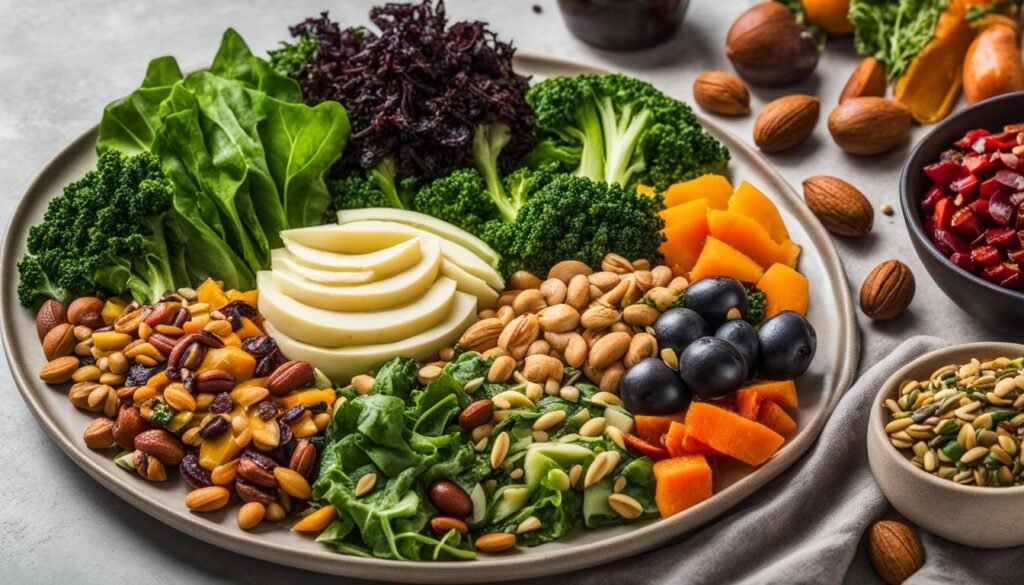
By focusing on a diverse range of plant-based foods and considering nutritional supplements, individuals can maintain optimal nutrition while following a low carb vegan diet.
Sample Low Carb Vegan Meal Plan
Achieving your health and weight loss goals on a low carb vegan diet requires careful meal planning. A well-structured meal plan can help you ensure a balanced intake of nutrients while keeping your daily carbohydrate intake around 100 to 125 grams. Here’s a sample low carb vegan meal plan to get you started:
Day 1
- Breakfast: Avocado and spinach smoothie with almond milk.
- Lunch: Quinoa and vegetable stir-fry with tofu.
- Snack: Raw almonds and carrot sticks.
- Dinner: Zucchini noodles with marinara sauce and vegan meatballs.
- Snack: Fresh berries with coconut yogurt.
Day 2
- Breakfast: Chia pudding made with almond milk and topped with sliced almonds and berries.
- Lunch: Mixed greens salad with roasted vegetables and chickpeas.
- Snack: Vegan protein bar.
- Dinner: Cauliflower rice stir-fry with tempeh and mixed vegetables.
- Snack: Sliced cucumber with hummus.
Day 3
- Breakfast: Vegan protein pancakes topped with almond butter and sliced bananas.
- Lunch: Lentil and vegetable soup.
- Snack: Roasted edamame.
- Dinner: Baked tofu with steamed broccoli and quinoa.
- Snack: Apple slices with almond butter.
Remember to adjust portion sizes based on your individual calorie and macronutrient needs. It’s also important to incorporate a variety of fruits, vegetables, whole grains, and plant-based protein sources into your meal plan for a well-rounded nutritional profile.
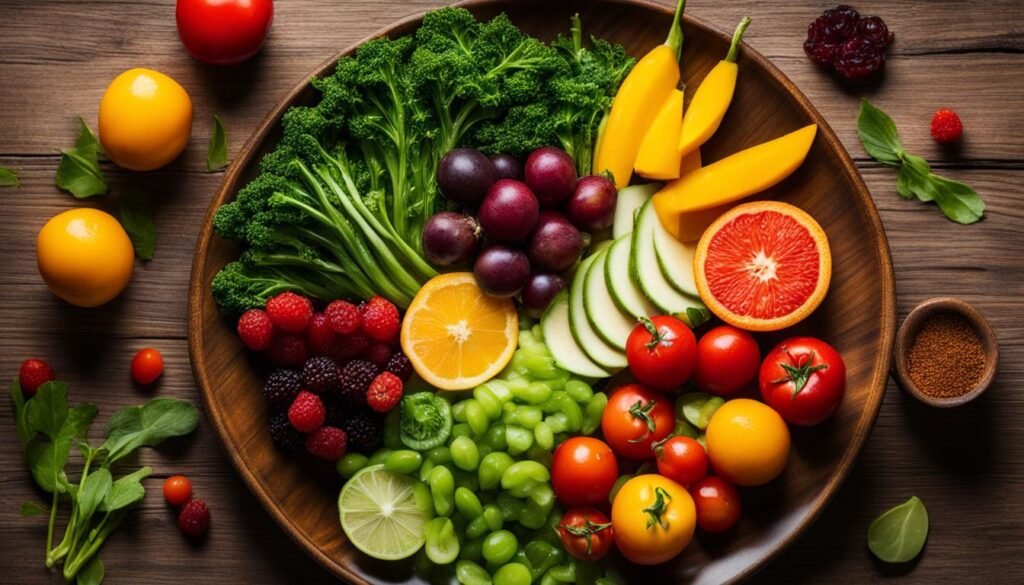
By following a carefully planned low carb vegan meal plan, you can enjoy a diverse array of delicious and satisfying meals while achieving your health and weight loss goals.
High-Protein Vegan Foods for a Low Carb Diet
Including high-protein vegan foods in a low carb vegan diet is crucial for maintaining muscle mass and promoting overall health. These foods provide essential amino acids and other nutrients necessary for optimal bodily functions. Incorporating these protein-rich options into meals and snacks ensures individuals meet their protein needs while following a low carb vegan lifestyle.
Examples of High-Protein Vegan Foods
Here are some excellent sources of plant-based protein that are low in carbs:
| Food | Protein Content (per 100g) | Carbohydrate Content (per 100g) |
|---|---|---|
| Tofu | 8g | 2g |
| Tempeh | 19g | 9g |
| Nuts and Seeds | 15-25g (varying) | 3-8g (varying) |
| Plant-Based Protein Powders | 15-30g (varying) | 2-5g (varying) |
These high-protein vegan foods provide the necessary building blocks for muscle development and repair. They are also rich in fiber, which aids digestion and helps maintain satiety.
It’s important to note that individual protein requirements may vary based on factors such as activity level, age, and overall health. Consult with a healthcare professional or registered dietitian to determine your specific protein needs on a low carb vegan diet.

Tips for Success on a Low Carb Vegan Diet
Switching to a low carb vegan diet requires some adjustments and careful planning. By developing healthy eating habits and making mindful choices, you can successfully follow this dietary lifestyle and reap its benefits.
1. Incorporate a Variety of Plant-Based Foods
One of the keys to a successful low carb vegan diet is to include a wide range of plant-based foods in your meals. This ensures that you receive a diverse array of nutrients and flavors. Try incorporating leafy greens, cruciferous vegetables, legumes, and whole grains into your meals to maximize nutrition.
2. Embrace Healthy Fats
While a low carb diet restricts carbohydrates, it is important to include healthy fats in your eating plan. Avocado, nuts, seeds, and plant-based oils like olive oil are excellent sources of healthy fats that provide satiety and support overall health.
3. Be Mindful of Carbohydrate Content
To maintain a low carb vegan diet, it is essential to be aware of the carbohydrate content of the foods you consume. Opt for low-carb fruits and vegetables, such as berries and leafy greens, and minimize or avoid high-carb foods like grains, starchy vegetables, and processed snacks.
4. Plan Your Meals and Snacks
Meal planning is vital for success on a low carb vegan diet. Take the time to plan your meals and snacks in advance, ensuring they are low in carbs and meet your nutritional needs. This will help you avoid impulsive food choices and stay on track with your healthy eating goals.
5. Stay Hydrated
Proper hydration is important for overall health and can support your low carb vegan diet. Make sure to drink plenty of water throughout the day to keep yourself hydrated and help maintain optimal bodily functions.
6. Seek Support
Transitioning to a low carb vegan diet can be challenging, especially if you are new to the lifestyle. Seek support from friends, online communities, or even a registered dietitian who specializes in plant-based diets. Sharing your journey and getting advice can help you stay motivated and navigate any difficulties.
| Healthy Eating Habits | Vegan Diet | Low-Carb Diet |
|---|---|---|
| Meal planning | Incorporate a variety of plant-based foods | Be mindful of carbohydrate content |
| Stay hydrated | Embrace healthy fats | |
| Seek support |
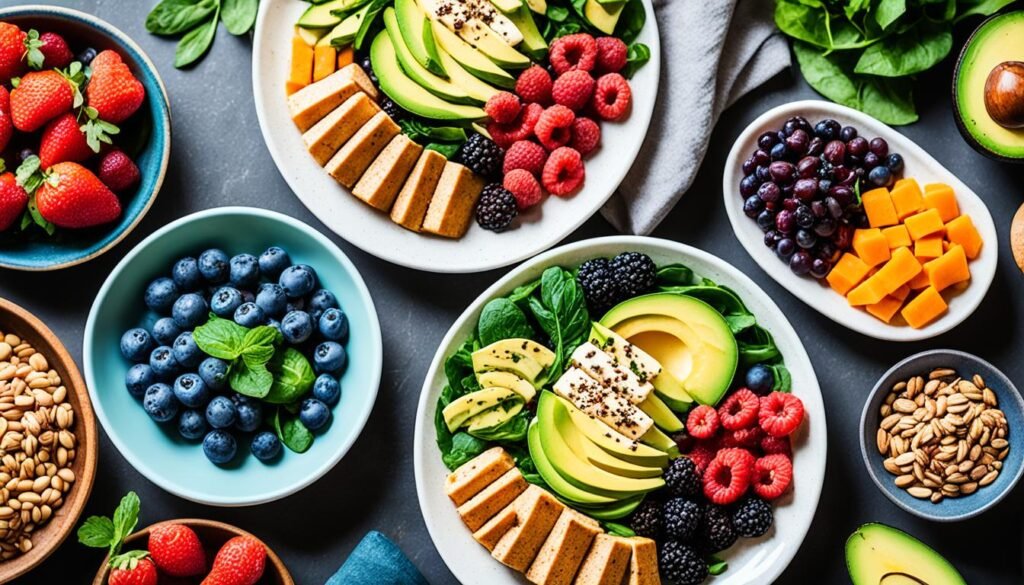
By following these tips and staying committed to your low carb vegan diet, you can achieve your health and wellness goals while enjoying a delicious and sustainable way of eating.
Overcoming Challenges on a Low Carb Vegan Diet
While the low carb vegan diet can be effective for achieving health goals, there are several challenges that individuals may encounter when transitioning to this lifestyle. Understanding and addressing these challenges can help individuals overcome them and successfully follow a low carb vegan diet.
Adjustments when Going from a Standard Vegan Diet to a Low Carb Vegan Diet
Transitioning from a standard vegan diet to a low carb vegan diet requires making adjustments in food choices and meal planning. Since the low carb vegan diet involves reducing carbohydrate intake, it is essential to find alternative sources of nutrients such as protein and healthy fats. Incorporating plant-based protein sources like tofu, tempeh, and nuts and seeds can help meet protein requirements. Additionally, focusing on healthy fats from avocados, coconut oil, and nuts can provide the necessary energy and satiety.
Dealing with Bad Breath and Keto Flu
When initially adopting a low carb vegan diet, some individuals may experience symptoms like bad breath and keto flu. Bad breath can occur due to the increased production of ketones, which is a result of the body transitioning to burning fat for fuel. To mitigate bad breath, maintaining good oral hygiene, staying hydrated, and chewing sugar-free gum or using breath fresheners can help freshen the breath.
Keto flu, characterized by symptoms like fatigue, headache, and nausea, may also be experienced during the transition phase. This can happen as the body adjusts to the low carb intake and shifts from using carbohydrates to burning fat for energy. Ensuring proper hydration, consuming electrolytes, and gradually reducing carbohydrate intake can help alleviate these symptoms.
Seeking Support and Guidance
When facing challenges on a low carb vegan diet, seeking support and guidance from experts or online communities can be beneficial. Connecting with other individuals following a similar dietary lifestyle can provide motivation, helpful tips, and recipe ideas. Registered dietitians or nutritionists with expertise in vegan and low carb diets can offer personalized guidance to address specific concerns and optimize nutritional intake.
Remember, the journey to a low carb vegan lifestyle requires patience and perseverance. Overcoming challenges and seeking support can empower individuals to successfully follow a low carb vegan diet and achieve their health goals.

| Challenges | Strategies to Overcome |
|---|---|
| Adjusting to a low carb vegan diet | – Find alternative plant-based protein sources – Incorporate healthy fats – Focus on meal planning |
| Dealing with bad breath | – Maintain good oral hygiene – Stay hydrated – Chew sugar-free gum or use breath fresheners |
| Managing keto flu symptoms | – Ensure proper hydration – Consume electrolytes – Gradually reduce carbohydrate intake |
| Seeking support and guidance | – Connect with online communities – Consult with registered dietitians or nutritionists |
Health Risks and Considerations of a Low Carb Vegan Diet
While a low carb vegan diet can offer numerous health benefits, it is important to be aware of any potential risks and consider individual health considerations. It is recommended to consult with a healthcare professional before making significant dietary changes, especially if you have pre-existing conditions.
Research suggests that a low carb vegan diet may have positive effects on reducing the risk of certain cancers and improving cholesterol levels.
Studies have indicated that following a low carb vegan diet may lower the risk of certain cancers, such as breast, colon, and prostate cancer, due to its emphasis on plant-based foods rich in antioxidants and phytochemicals.
Furthermore, a low carb vegan diet can contribute to improving cholesterol levels, as it typically avoids high cholesterol animal products and focuses on plant-based foods that are low in saturated fats and high in fiber.
However, it is essential to remember that individual results may vary, and it is always important to seek personalized advice from a healthcare professional to assess the potential impact of a low carb vegan diet on specific health conditions. Regular monitoring of blood sugar, cholesterol, and other relevant indicators may be necessary to ensure optimal health.
Always prioritize a balanced and diverse approach to your dietary choices, taking into account your unique circumstances and health needs.
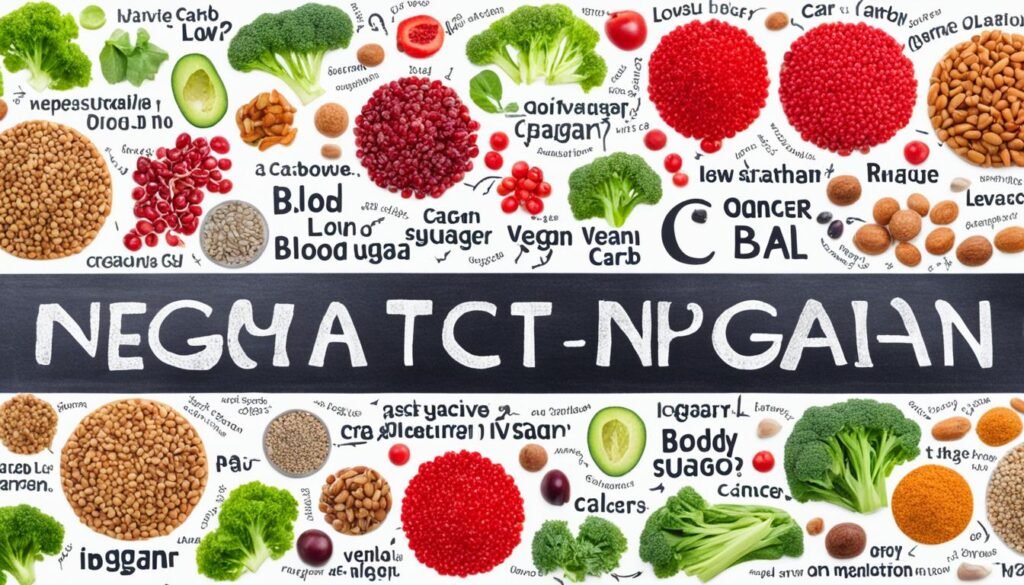
Delicious Low Carb Vegan Recipes
Incorporating delicious low carb vegan recipes into your meal plan can make following this dietary lifestyle more enjoyable. From low carb vegan meal plans to snacks and desserts, there are plenty of options available. Exploring recipes that are high in protein, low in carbs, and satisfy your taste buds can help you stick to a low carb vegan diet.
Low Carb Vegan Meal Plan
If you’re looking to kickstart your low carb vegan diet, having a meal plan can be incredibly helpful. Here’s a sample meal plan to get you started:
| Meal | Recipe |
|---|---|
| Breakfast | Scrambled tofu with spinach and mushrooms |
| Lunch | Spinach salad with roasted chickpeas and avocado dressing |
| Dinner | Stuffed bell peppers with quinoa, black beans, and salsa |
| Snack | Roasted almonds and cucumber slices |
Feel free to customize this meal plan according to your preferences and nutritional needs. Remember to focus on whole, plant-based foods and limit your intake of processed ingredients.
Low Carb Vegan Snacks
Snacking can be challenging on a low carb vegan diet, but there are plenty of options to satisfy your cravings. Here are some low carb vegan snacks to try:
- Chia pudding topped with berries
- Roasted chickpeas seasoned with spices
- Veggie sticks with guacamole
- Kale chips
- Edamame beans
These snacks are not only low in carbs but also packed with nutrients to keep you energized throughout the day.
Vegan High Protein Diet
Getting enough protein on a vegan diet can be a concern for some, but there are plenty of plant-based protein sources to choose from. Here are some high-protein vegan foods to incorporate into your low carb meals:
- Tofu
- Tempeh
- Lentils
- Quinoa
- Chickpeas
- Hemp seeds
These protein-rich foods will help support muscle growth and repair while keeping your carb intake in check.
Low Carb Vegan Dessert Recipes
Just because you’re following a low carb vegan diet doesn’t mean you have to miss out on desserts. Here are some tasty low carb vegan dessert recipes to satisfy your sweet tooth:
- Chocolate avocado mousse
- Coconut chia pudding
- Almond flour cookies
- Blueberry coconut ice cream
- Matcha green tea energy balls
These desserts are indulgent, yet still fit into a low carb vegan lifestyle. Enjoy them in moderation as a treat!
With these delicious low carb vegan recipes, you can enjoy a variety of flavorful meals, snacks, and desserts while staying true to your dietary goals. Make meal planning and cooking an enjoyable experience by exploring new recipes and experimenting with different flavors.
Also Read : Keto Diet Plan Guide for Effective Weight Loss

Staying Motivated on a Low Carb Vegan Diet
Maintaining motivation on a low carb vegan diet can sometimes be challenging. However, by keeping your health goals and the benefits of this dietary lifestyle in mind, you can stay on track and achieve long-term success. Here are some tips to help you stay motivated:
- Find Your Why: Take the time to reflect on why you chose to try a low-carb vegan diet. Whether it’s for weight loss, improved health, or ethical reasons, reminding yourself of your reasons can provide the motivation you need.
- Connect with Others: Surround yourself with like-minded individuals who are also following a low carb vegan diet. Join online communities, attend vegan meetups, and share your journey with friends and family. Their support and encouragement can make a big difference.
- Experiment with Delicious Recipes: Explore the world of low carb vegan cooking and discover new, flavorful recipes that align with your dietary goals. Finding delicious meals and snacks that fit your low carb vegan lifestyle will keep you excited about what you’re eating.
- Track Your Progress: Keep a journal or use a tracking app to monitor your progress. Recording your weight loss, improved energy levels, and other positive changes can boost your motivation and remind you of the progress you’ve made.
- Set Realistic Goals: Break your long-term goals into smaller, achievable milestones. Celebrating these small victories along the way will keep you motivated and motivated to continue your low carb vegan journey.
- Stay Educated: Continuously educate yourself about the benefits of a low carb vegan diet. By understanding how this dietary lifestyle can help you lose weight and improve your overall health, you’ll be more motivated to stick with it.
Remember, staying motivated is key to successfully following a low carb vegan diet. By finding your why, connecting with others, experimenting with delicious recipes, tracking your progress, setting realistic goals, and staying educated, you can stay on track and achieve the weight loss and health improvements you desire.
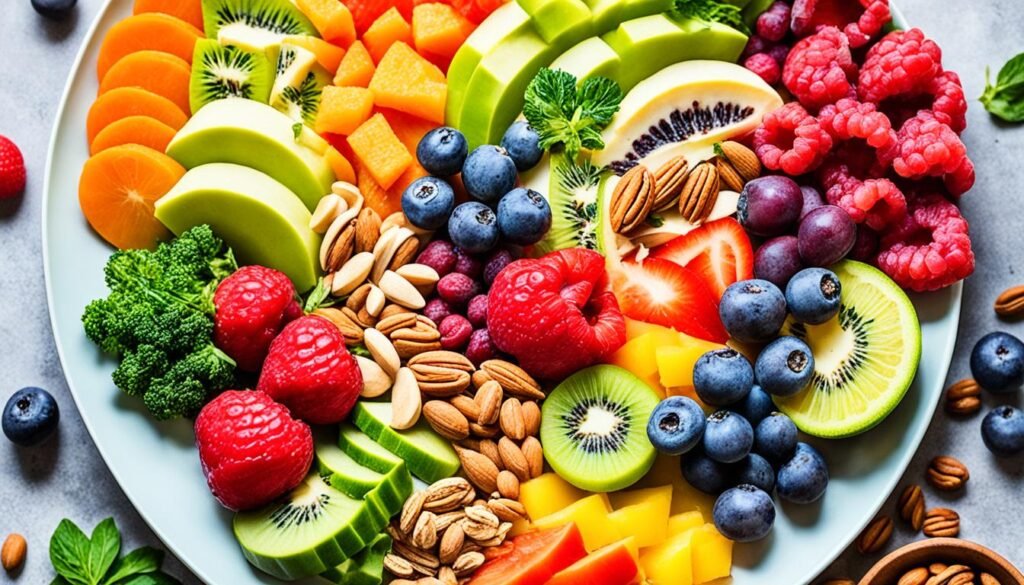
Keep in mind that everyone’s journey is unique, and it’s important to listen to your body and adjust your low carb vegan diet accordingly. Consulting with a registered dietitian or healthcare professional can provide personalized guidance and support.
Conclusion
In conclusion, a balanced vegan diet combined with a low carb approach can be a powerful tool for achieving weight loss and improving overall health. By focusing on plant-based foods and reducing carbohydrate intake, individuals can experience a wide range of benefits. One notable advantage is the potential for lower blood pressure, which can contribute to better cardiovascular health.
Following a low carb vegan diet allows individuals to nourish their bodies with nutrient-rich plant-based foods while minimizing the intake of processed and high-carb options. This can lead to improved weight management, reduced inflammation, and better control of blood sugar levels. However, it is essential to remember that every person is unique, and consulting with a healthcare professional is crucial to ensure dietary needs are met.
Adopting a balanced vegan diet with a low carb focus can foster long-term success by providing a variety of vitamins, minerals, and antioxidants while managing carbohydrates effectively. Integrating a range of whole plant foods, such as leafy greens, legumes, and nuts, can help meet nutritional needs and support overall well-being.
Remember that transitioning to a low carb vegan diet does not have to be overwhelming. Gradual changes, meal planning, and exploring creative and delicious low carb vegan recipes can help make the journey enjoyable. With commitment, motivation, and proper guidance, a balanced vegan diet can be a pathway to achieving optimal health and well-being.
FAQ
Q: What is a low-carb vegan diet?
A: A low-carb vegan diet is a diet that is both low in carbs and animal products, focusing on plant-based foods while limiting carb intake.
Q: How does a low-carb vegan diet differ from a traditional vegan diet?
A: A low-carb vegan diet focuses on reducing carb intake, while a traditional vegan diet does not have restrictions on carb consumption.
Q: Is a low-carb vegan diet similar to a keto diet?
A: Yes, a low-carb vegan diet can be similar to a keto diet as both emphasize low carb intake, but a vegan keto diet specifically avoids animal products.
Q: What are some benefits of following a low-carb vegan diet?
A: Benefits of a low-carb vegan diet may include weight loss, improved blood sugar control, and reduced risk of certain diseases.
Q: Are there specific foods that should be included in a low-carb vegan diet?
A: Yes, foods such as leafy greens, nuts, seeds, tofu, and non-starchy vegetables are good options for a low-carb vegan diet.
Q: How many grams of carbs per day are recommended on a low-carb vegan diet?
A: The recommended daily carb intake on a low-carb vegan diet can vary, but typically ranges from 20-50 grams per day.
Q: Can a low-carb vegan diet help with weight loss?
A: Yes, following a low-carb vegan diet may help with weight loss as it can lead to a reduction in overall calorie intake and promote fat burning.
Q: Are there any foods that should be avoided on a low-carb vegan diet?
A: Foods to avoid on a low-carb vegan diet include high-carb foods like grains, fruits, starchy vegetables, and processed sugars.
